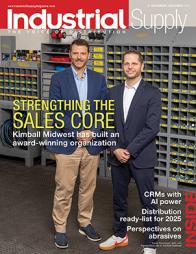Vendor Managed Inventory: Mutual Advantage, Myth or Reality?
by Howard Coleman
 Recently, I've done some thinking about VMI. It was motivated by some recent articles that appeared in various industry trade magazines and Web sites.
Recently, I've done some thinking about VMI. It was motivated by some recent articles that appeared in various industry trade magazines and Web sites.
Although VMI lately has sometimes been proffered as a "new chapter" in supply chain management, it really has been around awhile. Personally I have viewed it favorably as a supplier value-added service, but my general concern has always been, "What's in it for each party?" What's the mutual advantage? What is it that a supplier can do, and that's really different - that a distributor can't do?
In fact, the major question that has to be asked about VMI is, "Where does it take cost out of the supply chain?" Will it, in fact, take out cost from your supply chain or just transfer that cost somewhere else? If it doesn't take out cost, then you have to evaluate (or re-evaluate) VMI on different terms.
The obvious benefit to a distributor is a reduction in product inventory replenishment planning, administration and overhead costs, and at least the potential for a redirection, a refocus, of purchasing/buyer efforts toward other priorities; a focus on other value-added activities in supply chain management, and a positive impact on product data alignment and integrity.
It seems that the obvious benefits to a supplier is the additional visibility that a supplier gains into the distributor's product replenishment requirements, through the sales/demand data furnished by the distributor, as well as an overall and deeper capture and control of the distributor's buy side of the business.Think about it: if a supplier has VMI programs with multiple distributors, all buying the same or similar products, it becomes obvious that the supplier gains a real advantage for their own master production planning and scheduling purposes. Now, that's a real advantage for the supplier!
Even if there are specific and mutually agreed upon performance goals and objectives governing a VMI relationship, what says that the supplier can be more effective at inventory/supply chain management than the distributor? It doesn't seem so long ago that every distributor strived for the latter as a "core competency." So, what will the supplier really do differently? What do they know, what knowledge or tools do they have, what specific capabilities do they possess, that translates into doing it better? For instance, this could mean increasing the return on your inventory investment, through increased inventory turns, fewer stock-outs, etc.
Specifically, what concerned me about what I learned from my readings was what seemed to be a conflation of actions that some distributors took, in addition to VMI. Did this possibly skew the results and measurements? For instance, one reported major action, by a distributor, was a reduction in the number of central distribution locations that supported their branches. That alone, and "Inventory Management 101" tells us that depending on the magnitude of the central distribution location reduction, and the demand consolidation that occurs as a result at the remaining locations, we should expect a favorable if not a significant inventory impact. How much would, and did, VMI contribute to the result? In fact, some decrease in inventory was attributed to VMI, in this case, but it was not viewed as the major advantage - data quality and integrity was - and I would agree, the latter surely has some value in the equation.
Through this demand consolidation, in the case above, we would expect that replenishment quantities for each remaining central distribution location would increase due to fewer central distribution points, and the article confirmed just that, but also said that replenishments from suppliers were more frequent. Again, "Inventory Management 101" tells us that the more frequently supplier replenishment occurs, the smaller the replenishment quantities will tend to be. So, it is not entirely clear what really happened in this case.
Increased sales, in one reading, was attributed to VMI, without a lot of explanation as to how this occurred. Was it an improved in-stock position? Was it new products being added (with the implication of some associated increase in inventory)?
In another reading, VMI was attributed as providing visibility into excess inventory as well as redeploying that inventory among other locations. Why was VMI needed to do that? Any reasonably effective ERP system today can highlight excess inventory, by location, and pretty simply generate the transactions for stock redeployment.
What I didn't learn from these readings is whether VMI is utilizing any new techniques or models for supply chain and inventory management that really impacts cost of inventory ownership. Is there any change in thinking about inventory replenishment? Is it still the old "inventory push" replenishment process model, only this time being used by the supplier, instead of the distributor? Is the supplier, in conjunction with a VMI program, offering an opportunity for a continuous flow of inventory? Is there any transformation in the body of knowledge? (You may want to refer to our recent white paper "Lean Principles in Wholesale Distribution Supply Chains - Do You Pull or Push?" for a more detailed explanation).
So it seems to me that VMI is really more about the collaborative relationship with your supplier, and that's good. VMI surely fosters solidifying that relationship, through potentially better channels of communication, the potential for coordinating new product introductions and promotions, and an overall better alignment of actions; again, admirable objectives.
What Questions Would I Ask If I Were You?
I think every distributor should examine VMI within the context of how they would "sell" VMI to their customers, as many industrial supply houses do today, for a variety of MRO and other type industrial products into factory stock-rooms, institutions, and the like. What is it that you would and could do better than your customer? How? Why? What is it that your customer would expect from the relationship? What truly would be your unique selling proposition? What is the R.O.I. to be promised, and/or expected, and specifically how will it be achieved? What processes and transaction types would you need to have in place to support VMI with your customer? What are the policies regarding excess inventory and returns? Answering these questions as a "seller of VMI" can help you turn them around into questions you could ask your supplier, as you examine and consider the potential for a VMI program with them.
Examine your own ERP system. Most forward-looking distributors today have poured a lot of dollars into their enterprise systems. Specifically, as it regards the purchasing and inventory management/replenishment module, are you utilizing it to its fullest to optimize your inventory turns and return on investment? To be honest, I usually find about 40-50% of the capabilities actually get used; not necessarily a good reason to hand off replenishment responsibility to someone else and surely not encouraging from an R.O.I. perspective. Does, or will, your supplier be able to add anything different to the return on supply chain management? Will they employ any different principles that advance inventory and supply chain management and not just transfer costs?
If you go VMI, what will be the refocus of your current personnel responsible for supplier relationships, and inventory and supply chain management? What will they be doing differently on day one and going forward? What new or additional tasks will they have and what value will they be adding to the inventory and supply chain planning equation - as well as to the expected outcomes? What will they add to the VMI process and supplier interaction, which advances overall VMI effectiveness?
Summary
Where does VMI take cost out of the supply chain? I think this and the other questions we've asked, are fair questions to have answered and evaluated. They are, I hope, similar to the questions you probably asked when you were buying your new enterprise system or when considering the impacts of other strategic decisions you've made; where is the real pay-back, both quantitatively and qualitatively.
Finally, I ask you to share your VMI thoughts and/or experiences with me.
Contact: hcoleman@mcaassociates.com or 203-732-0603. Visit www.mcaassociates.com.
Howard Coleman is the principal of MCA Associates, a management consulting firm since 1986. MCA works with wholesale distribution and manufacturing clients that are committed to seeking operational excellence. MCA Senior Consultants provide idea leadership and implement continuous improvement solutions focused on business process re-engineering, inventory and supply chain management, sales development and revenue generation, information systems and technology, organizational assessment and development, and succession planning.











